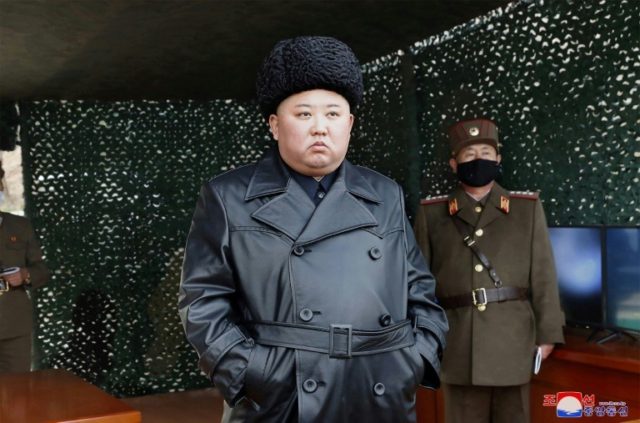The Transitional Justice Working Group (TJWG), a human rights organization based in Seoul, South Korea, published a report Wednesday accusing communist North Korea of holding more executions in secret to evade international scrutiny.
“Our findings suggest that the Kim Jong Un regime is paying more attention to human rights issues due to increased international scrutiny. This does not mean the human rights situation there is improving – state-led killings continue to take place in ways that may not be as publicly visible as before,” said Park Ah-yeong, lead author of the report.
The name of Park’s group, “Transitional Justice,” refers to the notion of holding human rights violators accountable to “transition” out of tyranny or barbarism.
Transitional justice is considered a necessary prerequisite for liberalization by the United Nations because holding violators accountable, instead of forgetting past offenses in the rush to move forward, helps prevent backsliding into “systematic discrimination or violence.” TJWG’s report also suggested transitional justice is important for restoring the mental health of a society like North Korea that has grown desensitized to atrocities.
Of course, authoritarian regimes do not like being held accountable for human rights violations, and brutal dictatorships like North Korea have many ways of hiding their misdeeds.
Reuters on Wednesday noted the regime in Pyongyang “does not answer questions from foreign reporters or publish data on its judicial system,” its state media rarely reports on crime and punishment, and its hideous prison camps are closed to human rights monitors.
TJWG, therefore, used satellite photos and interviews with North Korean defectors to prepare its report, which charged the evolution of execution practices under dictator Kim Jong-un after he took power in 2011.
The group’s analysis suggested North Korea has lost some of its enthusiasm for public executions in front of huge, unruly crowds.
As pressure from human rights organizations mounted and Kim flirted with business opportunities in the outside world, executions were held before smaller, more carefully vetted crowds, moved further away from North Korea’s borders, and kept hidden from satellites. The audiences now include a large number of students, who are “systematically mobilized to attend public trials.”
“Assembled audiences at public killing events are strictly monitored and controlled by state officials to prevent information on public executions from leaking. Inhumane treatment of the accused before execution – used as a warning to the public – has persisted,” TJWG found.
The report also found more high-profile pardons were issued by the regime, to “propagandize the benevolence of Kim Jong-un.”
According to hundreds of North Korean escapees interviewed for the report, the most common offense cited at public executions under Kim Jong-un has been “watching or distributing South Korean videos.”
At least seven North Koreans were executed from 2012 to 2014 in Hyesan, an important hub for cross-border trade, because they watched South Korean “K-Pop” music videos. TJWG said the family members of the victims were forced to watch the executions.
In a similar vein, North Korea reportedly sentenced a smuggler to death in November for smuggling illicit copies of the hit South Korean television show Squid Game across the border.
The other most common capital offenses cited in the TJWG report were drug-related crimes, prostitution, human trafficking, murder, and “obscene acts.”
TJWG researchers suspected charges like “human trafficking” and “kidnapping” were often applied to people accused of helping other North Koreans escape from the communist tyranny. They also noted escapees captured by North Korean border patrols have a pronounced tendency to commit “suicide,” disappear completely, or die of “malnutrition” in custody, so they should probably be counted as executions.
Most of the killings were reportedly carried out by firing squad, although a few hangings have been documented, plus a 2014 event in which the condemned was allegedly killed by choking him with pebbles. Evidence suggests audience members are often forced to stand in line to examine the corpse after the sentence of death is carried out, even if the result was exceptionally gruesome.
Convicted criminals in North Korea do not enjoy much of an appeals process, as many of the executions tracked by TJWG were carried out at the trial. TJWG’s sources were not certain how the remains were disposed of, although in one notable case the executed prisoner was incinerated with a flamethrower before the horrified eyes of his father, who fainted during the procedure.
The report urged human rights monitors to be prepared to step in and secure sites where executions were conducted and bodies might be interred, to prevent the destruction of evidence “in case of a sudden collapse of the North Korean government, or during a transitional period on the Korean peninsula.”
“We recorded no cases of public executions with charges of stealing and/or selling machines or materials pilfered from factories or from infrastructure such as power lines in the Kim Jong-un era. These charges were common in the 1990s and 2000s according to our data,” the report’s authors noted.
“Documenting secret or ‘indoor’ killings is our next step. There are an increasing number of news reports quoting clandestine information sources inside North Korea about this type of killing in the last five to six years,” said TJWG Executive Director Hubert Younghwan Lee.

COMMENTS
Please let us know if you're having issues with commenting.